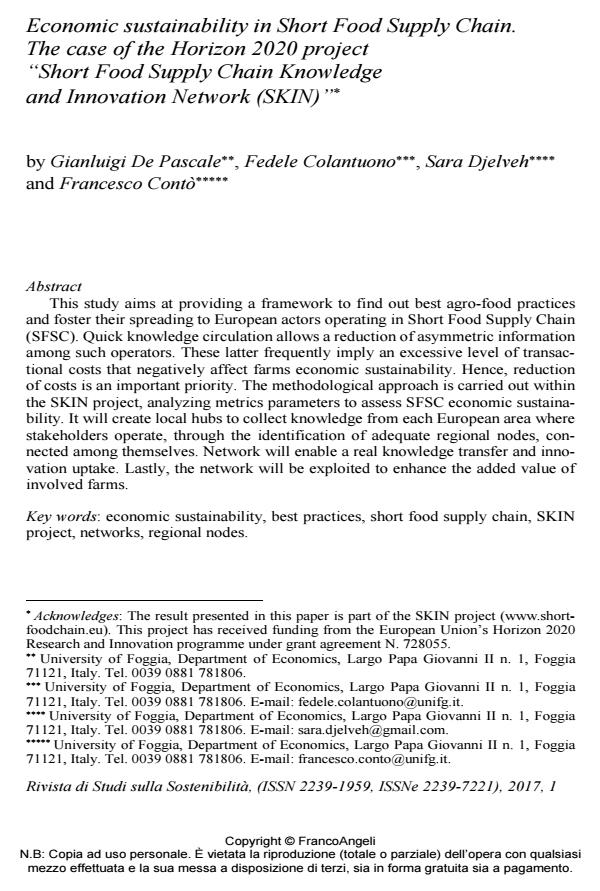Economic sustainability in Short Food Supply Chain. The case of the Horizon 2020 project "Short Food Supply Chain Knowledge and Innovation Network (SKIN)"
Titolo Rivista RIVISTA DI STUDI SULLA SOSTENIBILITA'
Autori/Curatori Gianluigi De Pascale, Fedele Colantuono, Sara Djelveh, Francesco Contò
Anno di pubblicazione 2017 Fascicolo 2017/1
Lingua Inglese Numero pagine 13 P. 169-181 Dimensione file 210 KB
DOI 10.3280/RISS2017-001011
Il DOI è il codice a barre della proprietà intellettuale: per saperne di più
clicca qui

FrancoAngeli è membro della Publishers International Linking Association, Inc (PILA)associazione indipendente e non profit per facilitare (attraverso i servizi tecnologici implementati da CrossRef.org) l’accesso degli studiosi ai contenuti digitali nelle pubblicazioni professionali e scientifiche
This study aims at providing a framework to find out best agro-food practices and foster their spreading to European actors operating in Short Food Supply Chain (SFSC). Quick knowledge circulation allows a reduction of asymmetric information among such operators. These latter frequently imply an excessive level of transactional costs that negatively affect farms economic sustainability. Hence, reduction of costs is an important priority. The methodological approach is carried out within the SKIN project, analyzing metrics parameters to assess SFSC economic sustainability. It will create local hubs to collect knowledge from each European area where stakeholders operate, through the identification of adequate regional nodes, connected among themselves. Network will enable a real knowledge transfer and innovation uptake. Lastly, the network will be exploited to enhance the added value of involved farms.
Questo studio fornisce un metodo per individuare e diffondere le buone prati-che nell’ambito della filiera corta agroalimentare, in maniera tale che gli attori stessi possano fruirne. Una circolazione dinamica delle conoscenze consente la ri-duzione dell’asimmetria informativa tra tali operatori. Questi ultimi spesso lamen-tano un livello troppo alto dei costi di transazione, che incidono negativamente sulla sostenibilità delle loro aziende. Quindi, la loro riduzione è una priorità. L’approccio metodologico è affrontato nell’ambito del progetto SKIN, analizzando i parametri metrici per valutare la filiera corta agroalimentare. Si creerà una rete fatta di nodi regionali, tutti interconnessi tra loro, per la raccolta di buone pratiche. La rete permetterà un reale trasferimento e utilizzo delle innovazioni e della conoscenza. Infine, la rete sarà utilizzata per aumentare il valore aggiunto delle aziende coinvolte.
Parole chiave:Sostenibilità economica, buone pratiche, filiera corta agroalimenta-re, progetto SKIN, reti, nodi regionali
- Berti G., Mulligan C. (2016). Competitiveness of Small Farms and Innovative Food Supply Chains: The Role of Food Hubs in Creating Sustainable Regional and Local Food Systems. Sustainability, 8(7): 616.
- Contò F., Faccilongo N., La Sala P., Dicecca R. (2013a). Cloud approach for short chain administration. Procedia Technology, 8: 600-605.
- Contò F., Fiore M., La Sala P. (2013b). The role of innovation in the integrated processes of Integrated Project of Food Chain: the case of cherry cultivation chain in Apulia region. Intellectual Economics, 7, 4(18): 467-485.
- European Commission, EC (2015). EIP-AGRI Focus Group Innovative Short Food Supply Chain management, Final report.
- European Commission, EC (2015). Calls for proposals and related activities under the 2016-17 work programmes under Horizon 2020 – the Framework Programme for Research and Innovation (2014-20) and under the Research and Training Programme of the European Atomic Energy Community (2014-18) complementing Horizon 2020. Official Journal of the European Union (2015/C 399/02).
- Fiore M. (2016). Direct selling in the wine sector: lessons from cellars in Italy’s Apulia region. British Food Journal, 118(8).
- Foray D., David P.A., Hall B. (2009). Smart specialization – the concept. Knowledge Economists Policy Brief, 9(85): 100.
- Foray D., Goenaga X. (2013). The goals of smart specialisation. Luxembourg: Publications Office of the European Union.
- Gobble M.M. (2016). News and Analysis of the Global Innovation Scene. Research-Technology Management, 59(3): 2-9.
- Kelly P.J. (2014). Information efficiency and firm-specific return variation. The Quarterly Journal of Finance, 4(04): 1450018.
- Levidow L., Neubauer C. (2014). EU research agendas: Embedding what future? Science as Culture, 23(3): 397-412.
- Libecap Gary D. (2014). Addressing Global Environmental Externalities: Transaction Costs Considerations. Journal of Economic Literature, 52(2): 424-479(56), June.
- Reimann F., Shen P., Kaufmann L. (2017). Multimarket Contact and the Use of Power in Buyer-Supplier Relationships. Journal of Business Logistics.
- Sara D., Francesco C. (2016). University knowledge exchange and the SKIN Project. Research on Education and Media, 8(2): 33-41.
- Thissen M., van Oort F., Diodato D., Ruijs A. (2013). Regional Competitiveness and Smart Specialization in Europe: Place-based development in international economic networks. Edward Elgar Publishing.
- Williamson O.E. (2008). Outsourcing: Transaction cost economics and supply chain management. Journal of Supply Chain Management, 44(2): 5-16.
- World Bank (2016). World Development Report 2016: Digital Dividends, World Bank, Washington, D.C.
- Evolución y tendencias de la investigación científica en circuitos cortos de comercialización: análisis bibliométrico internacional. Jessica Geraldine Villatoro Hernandez, Monserrat Vidal Álvarez, Ariel Vázquez Elorza, in Agricultura, Sociedad y Desarrollo /2023
DOI: 10.22231/asyd.v20i2.1522 - Directions for Ensuring the Equivalence of Exchange in Agri-Food Chains in Ukraine Olha.O. Varchenko, in Visegrad Journal on Bioeconomy and Sustainable Development /2021 pp.29
DOI: 10.2478/vjbsd-2021-0007 - Consumers’ Willingness to Pay for Agri-Food Products Delivered with Electric Vehicles in the Short Supply Chains Antonino Galati, Giuseppina Migliore, Alkis Thrassou, Giorgio Schifani, Giuseppina Rizzo, Nino Adamashvili, Maria Crescimanno, in FIIB Business Review /2023 pp.193
DOI: 10.1177/23197145221112743
Gianluigi De Pascale, Fedele Colantuono, Sara Djelveh, Francesco Contò, Economic sustainability in Short Food Supply Chain. The case of the Horizon 2020 project "Short Food Supply Chain Knowledge and Innovation Network (SKIN)" in "RIVISTA DI STUDI SULLA SOSTENIBILITA'" 1/2017, pp 169-181, DOI: 10.3280/RISS2017-001011